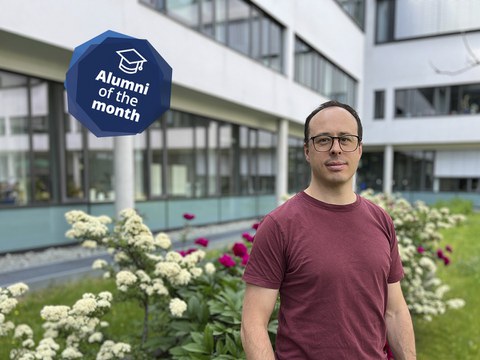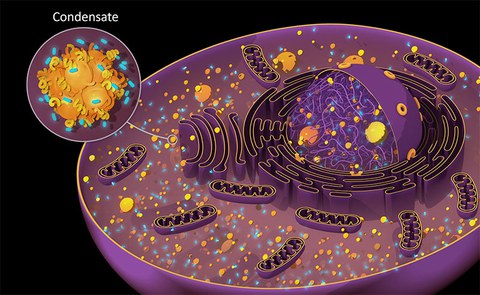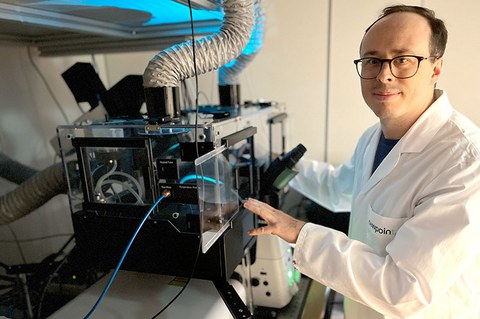Be clear about what your strengths are!
(interviewed in 2023)
Thomas Scheufler
Dr. Matthäus Mittasch studied nanobiophysics. Today, he is researching "small molecule drugs" - novel drugs based on biomolecular condensates for the treatment of civilization diseases.
| Profile | Matthäus Mittasch |
| Degree program: | M. Sc. Nanobiophysics and PhD in Physics |
| Faculty | Biotechnology Center - BIOTEC (M. Sc.), MPI-CBG and Faculty of Physics (PhD) |
| Study period | Oct. 2010 – April 2013 (M.Sc. Nanobiophysik) April 2014 – March 2018 (Dr. rer. nat. Physik) |
| Current work | Principal Scientist at Dewpoint Therapeutics GmbH |

Matthäus MIttasch is the graduate of the month for September 2023.
Why did you decide to study at TU Dresden?
One of the major reasons coming to Dresden, was my desire to study in an international M. Sc. program. Back in the days, the Nanobiophyics program at the TU Dresden was one of the few interdisciplanry programs held fully in English. Morever, the strong integration of pratical research in tightly associated research groups and theoretical courses I found very exciting. For my PhD, I enrolled to the international max planck research school and the department of physics, my thesis work was performed at the MPI-CBG, Dresden.
What factors drove you to choose your field of study?
Coming from an engineering background, I wanted to dive deeper into basic research for my masters, for this I chose the Nanobiophysics program. Honestly, I was a little bit nervous enrolling in a physics program, however, since the program was particularly designed for students with different backgrounds that gave me confidence that I can do it. Futhermore, I found the combination of physics, materials science, and biology very inspiring.
Who from research and teaching influenced you the most during your studies?
There were many people, and I’m very sorry that I can’t name all of them, it started with my Bachelor thesis that I performed at medical physics department at Carl Gustav Carus, Prof. Edmund Koch and Peter Cimalla who egnited my deep desire for research. During my entire master duration I was working in the lab of Prof. Stefan Diez lab, the entire team was very nice and I learned what very good science means. During my PhD, I have to thank the entire MPI-CBG for their inspriring and driven ecosystem, specifically I have to thank Moritz Kreysig, Peter Groß, Anatol Fritsch and my doctor father Prof. Frank Jülicher.
Where are you employed today, and with what responsibilities?
Today, I work at Dewpoint Therapeutics, an international biotech start-up, which was originally launched in Dresden and Boston, now having even more sites. We are a drug discovery company, performing cutting-edge research on the basis of biomoeclular condensates, a scientific revolution that was spearheaded in Prof. Tony Hyman’s lab the MPI-CBG, Dresden. In my role, I’m leading a group for advanced imaging, we are combining high-resolution microsopy, image procressing, and complex data analysis to develop novel assays for biomolecular condensate drug discovery, with the ulitmate goal to cure life threathing diseases.

Illustration of a biological cell, with typical organelles such as the nucleus and the so-called "condensates", a new biological phase that has only very recently been discovered.
What advice would you give to today's first-year students?
Have fun and enjoy learning, be open and look around what really inspires you, maybe take courses that are not even part of your official curriculum if you know from your pears that they are amazing. Get your hands dirty, I always learned the most while working, so try to get a lab position as early as possible, this will help you tremdously in applying what you have learned and it will open the door to get into the top labs for your thesis and beyond.
What do you remember most fondly from your student days?
It was a very good time, having had the opportunity to meet young energetic scientist from all over the world in the field that interests you so much. Studying is a privelage that unfortentually not everyone has the chance to, therefore, it is a good time to get socially active and to do something for other people. And not to forget, besides your time studying, if there is good snow, you go skiing, from Dresden ist only about one hour to the mountains, or you can go hiking. Something that is harder when you are in professional work environment, so enjoy your time.
Where was your favorite place at university?
I really like libraries, the SLUB though was always very busy and it was very hard to get a spot, therefore, I went fairly often to Leipzig to learn for my exams in the Albertina. But I also enjoyed the charme of the historical lecture halls of the mathematics and physics department having theoretical lectures on chalkboards, the good old classy way.
What do you still benefit from today/would you have liked more?
I still benefit very much from my network that I established during my Masters and PhD, Dresden has a very well connected scientific community, this is fantastic.

Dr. Mittasch's work environment
How do you manage a good career start in your industry?
I think the hardest part is to get your first industry position, for instance having had previous experiences like 3 month summer intern positions helps grately to overcome the initial hiring fire wall. Make sure that you understand your stengths and look for openings that match those skills. Building up a network as early as possible is very helpful too, you can share and discuss exerperiences with each other. If you have a computational backgound that’s your time, the entire biotech industry is graving for data sciencists.
What connects you with the TU Dresden today?
Today, I’m still very connected to the TU Dresden, it is fantastic having access for instance to cutting-edge microsopy technologies via the BioDip platform. As Dresden is a major hub for biomolecular condensates research, I’m in close contact with multiple research groups.
Contact:
Dr. Matthäus Mittasch
Principal Scientist Dewpoint Therapeutics GmbH
E-Mail
Web
LinkedIn
